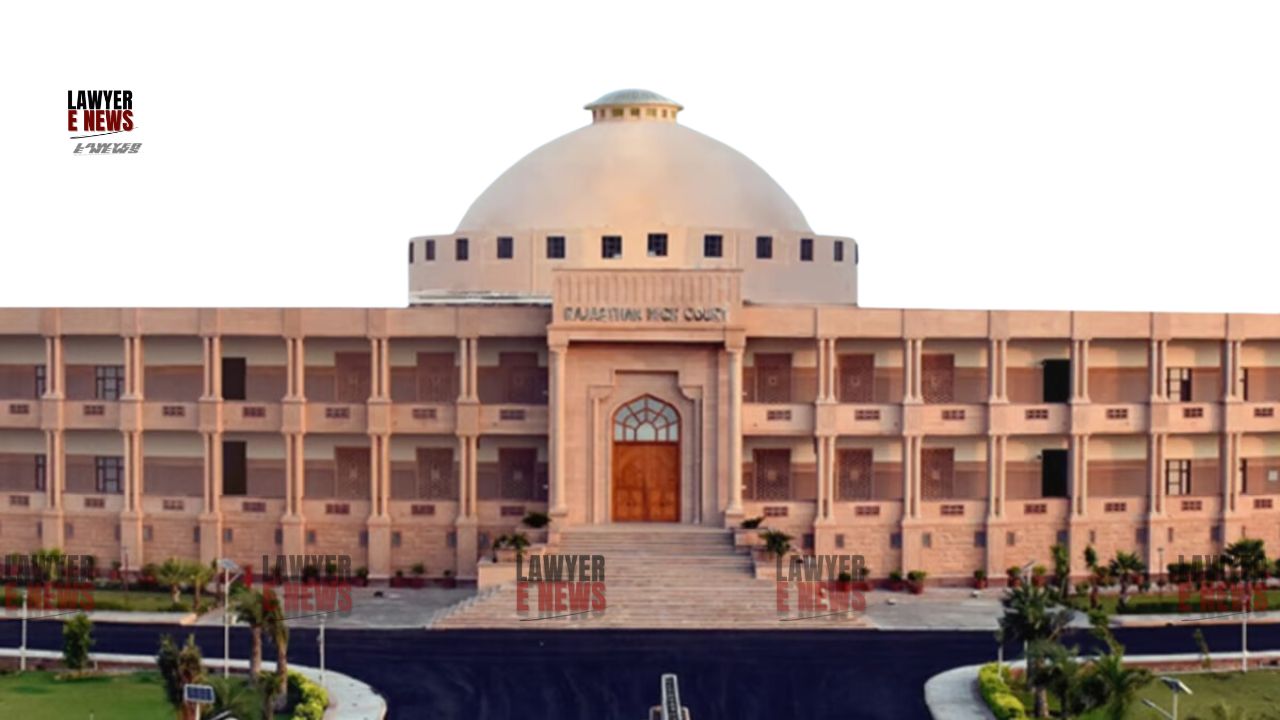-
by sayum
14 February 2026 2:22 PM



“If trial of a non-bailable offence triable by a Magistrate is not concluded within sixty days from the first date fixed for taking evidence, the accused shall be entitled to bail” – Justice Ganesh Ram Meena. In a significant ruling, the Rajasthan High Court granted bail to Banwari Lal Kushwah, who had been held in custody for over two years while awaiting trial on charges under Sections 420, 406, and 120B of the Indian Penal Code (IPC). The court highlighted the statutory mandate under Section 480(6) of the Bharatiya Nagarik Suraksha Sanhita, 2023 (BNSS), which requires bail if the trial for non-bailable offenses triable by a Magistrate is not concluded within sixty days from the first date set for evidence. The court ruled that the petitioner, held in prolonged pre-trial detention with minimal progress in trial, was entitled to bail.
The petitioner, Banwari Lal Kushwah, was charged under Sections 420 (cheating), 406 (criminal breach of trust), and 120B (criminal conspiracy) of the IPC in relation to a case registered at Police Station Mathura Gate, Bharatpur. He had been in custody since June 13, 2022, and faced extended detention due to procedural delays in the trial. The charges were framed on May 31, 2024, with the first date fixed for evidence on June 14, 2024. However, only one out of 33 prosecution witnesses had been examined by the time the bail application was considered.
The petitioner’s first bail application was rejected on September 10, 2024, but he filed a second bail application citing Section 480(6) of BNSS, which replaced Section 437(6) of the Code of Criminal Procedure (CrPC) and imposes a statutory mandate for bail if a Magistrate’s trial for a non-bailable offense is not concluded within sixty days from the first date of evidence.
Right to Bail under Section 480(6) of BNSS: The petitioner argued that Section 480(6) of BNSS, which mandates bail if a non-bailable offense triable by a Magistrate is not concluded within sixty days, was applicable in his case due to prolonged detention without trial progress.
Right to Speedy Trial: The petitioner contended that his prolonged custody violated his right to a speedy trial, particularly as he had already been in custody for over two years with minimal progress in the trial.
Concerns of Witness Tampering: The prosecution opposed the bail application, expressing concerns that the petitioner might influence prosecution witnesses if released on bail.
The court observed that Section 480(6) of the BNSS mandates that an accused be released on bail if the trial of a non-bailable offense triable by a Magistrate is not concluded within sixty days from the first date fixed for taking evidence. Justice Ganesh Ram Meena stated:
“Section 480(6) of BNSS explicitly mandates that a person shall be released on bail if the trial for non-bailable offenses triable by a Magistrate is not concluded within sixty days from the first date fixed for evidence in the case, provided the accused has been in custody for the entire period.”
The court noted that in this case, the first date for recording evidence was June 14, 2024, and sixty days had elapsed without meaningful progress in the trial, as only one out of 33 prosecution witnesses had been examined. This prolonged delay triggered the application of Section 480(6), entitling the petitioner to bail.
The court underscored the importance of the right to a speedy trial as a fundamental right, and found that extended pre-trial detention without substantial progress infringes on the accused's rights. The judge remarked:
“Keeping an accused in custody for an indefinite period without any significant progress in the trial infringes upon the rights of the accused under the mandate of Section 480(6) of BNSS.”
The court noted that the petitioner had already been in custody for over two years, during which only minimal progress had been made in the trial. This delay, the court held, was sufficient to grant bail, as continued detention would amount to punishment before conviction.
The prosecution opposed the bail application, arguing that the petitioner could influence witnesses if released. However, the court found that these concerns were speculative and unsupported by concrete evidence. The court held that procedural safeguards could be put in place to address any legitimate concerns about witness tampering.
The Rajasthan High Court allowed the petitioner’s second bail application, directing that he be released on bail upon furnishing a personal bond of ₹1,00,000 with two sureties of ₹50,000 each. The court also imposed a condition requiring the petitioner to appear at all court hearings to ensure his participation in the trial.
“The accused-petitioner shall be released on bail upon furnishing a personal bond in the sum of ₹1,00,000 together with two sureties of ₹50,000 each to the satisfaction of the trial Court, with the stipulation that he shall appear before the Court on all subsequent dates of hearing.”
Mandatory Bail under BNSS for Delays in Trial: The court’s interpretation of Section 480(6) of BNSS highlights the mandatory nature of bail if a trial for non-bailable offenses triable by a Magistrate is not concluded within sixty days from the first date of evidence.
Right to Speedy Trial and Protection from Prolonged Detention: The judgment emphasizes that extended pre-trial detention without significant progress infringes on an accused’s right to a speedy trial, reinforcing the principle that custody should not become a substitute for punishment.
Balancing State’s Concerns and Accused’s Rights: While acknowledging the state’s concerns regarding witness tampering, the court found no basis to deny bail purely on speculative grounds, stressing the importance of procedural safeguards to balance these concerns.
Date of Decision: November 4, 2024
